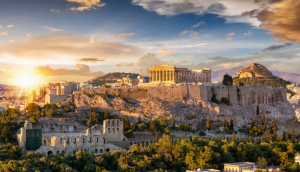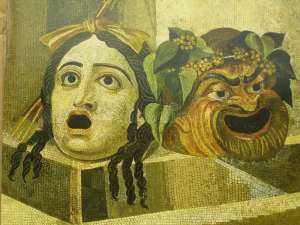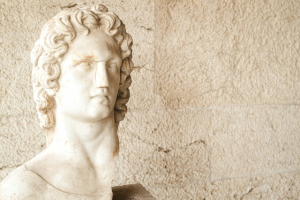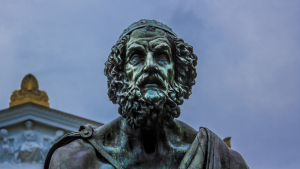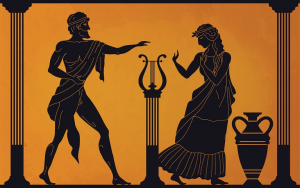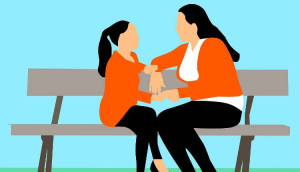XpatAthens
A Day Ιn Τhe Life Οf Αn Ancient Athenian
Here's a detailed look at how different individuals might spend their day.
Morning: The Start of the Day
Men:
- Rise with the Sun: Men typically rose at dawn. They would wash up quickly, often using cold water, as hot water was a luxury.
- Breakfast: A simple breakfast, known as "akratisma," consisted of barley bread dipped in wine, sometimes accompanied by figs or olives.
- Work & Public Affairs: For many men, the morning was a time for work. Farmers would head to their fields to tend to crops like olives, grapes, and grains. Craftsmen and artisans would open their workshops to work on pottery, textiles, or metal goods. Merchants might head to the agora, the bustling marketplace, to trade goods.
- Politics and Philosophy: In cities like Athens, men often engaged in political discussions or attended meetings at the assembly. Philosophers and students might gather at the gymnasium or in private homes to discuss ideas and theories.
Women:
- Household Chores: Women usually woke up early to manage household tasks. They were responsible for preparing meals, spinning and weaving cloth, and caring for children.
- Breakfast: Similar to men, women also had a simple breakfast. They might eat with their children before the day’s chores began.
- Domestic Work: Women spent much of the morning engaged in domestic duties, which included cleaning, fetching water, and making clothes.
Midday: The Heart of Daily Activities
Men:
- Continued Work: Farmers would continue their labor in the fields, while artisans and craftsmen worked on their trades. The marketplace remained lively with merchants and buyers haggling over goods.
- Meals: The midday meal, known as "ariston," was light, often consisting of bread, cheese, fruits, and perhaps some fish.
- Leisure and Socializing: Men might take a break to socialize at the agora, discussing politics, philosophy, or daily news. Public baths were also a popular place to relax and converse
- Household Management: Women continued with their household responsibilities. Wealthier women might have slaves to assist with chores, allowing them more time for weaving or managing household finances.
- Midday Meal: Women and children would have their ariston together, similar to what the men ate.
- Religious Duties: Women often participated in religious rituals and household worship, paying homage to gods and goddesses to ensure the family’s well-being.
Afternoon: Winding Down the Day
Men:
- Return Home: Farmers and workers would return home as the sun began to set. Before dinner, men might visit the public baths to cleanse and relax.
- Symposia and Social Gatherings: Wealthier men might attend symposia, which were social gatherings involving drinking, music, and philosophical discussions. These events were important for networking and entertainment.
- Dinner: The main meal of the day, "deipnon," was consumed in the evening. It included more substantial fare such as fish, legumes, vegetables, and occasionally meat. Wine, diluted with water, was a common accompaniment.
Women:
- Evening Chores: As the day wound down, women would finish any remaining chores, prepare for the evening meal, and ensure the household was in order.
- Dinner: Women and children would have their deipnon separately from the men. This meal was more substantial than the midday meal, featuring stews, bread, vegetables, and fruits.
- Evening Activities: After dinner, women might engage in spinning, weaving, or other crafts. They also participated in evening prayers and rituals.
- Family Time: After dinner, families might spend some time together before bed. Stories and myths were shared, often teaching moral lessons or entertaining the children.
- Rest: With the day's work done, the household would retire for the night, ready to begin the routine anew with the dawn.
5 Greek Tragedy Plays Everyone Should Watch
Here are five essential Greek tragedies that everyone should watch to appreciate the depth and beauty of this ancient art form!
1. Oedipus Rex (Oedipus the King) by Sophocles
"Oedipus Rex" is perhaps the most famous of all Greek tragedies. It tells the story of Oedipus, the king of Thebes, who is determined to rid his city of a plague. In his quest, he uncovers his tragic destiny: he has unwittingly killed his father and married his mother. The play explores themes of fate, free will, and the limits of human knowledge.
Why Watch It? The intricate plot and the intense emotional journey of Oedipus make this a must-see. Its exploration of fate and identity continues to resonate with modern audiences.
2. Antigone by Sophocles
"Antigone" is the sequel to "Oedipus Rex" and centers on Oedipus's daughter, Antigone. The play begins with the aftermath of a civil war in which Antigone's brothers have killed each other. King Creon, the new ruler, decrees that one brother will be honored while the other is left unburied. Antigone defies Creon’s orders to give her brother a proper burial, leading to tragic consequences.
Why Watch It? "Antigone" is a powerful examination of civil disobedience, the conflict between state and family loyalty, and the individual's moral duty versus societal laws.
3. Medea by Euripides
"Medea" is the harrowing story of Medea, a sorceress who takes revenge on her unfaithful husband, Jason. After Jason leaves her for another woman, Medea enacts a horrific vengeance, killing their children and Jason's new bride. Euripides' portrayal of Medea as a complex, multifaceted character challenges the audience's sympathies and preconceptions.
Why Watch It? The intense emotional drama and the radical portrayal of a woman's rage and agency make "Medea" a compelling and thought-provoking play.
4. The Oresteia by Aeschylus
"The Oresteia" is a trilogy consisting of three plays: "Agamemnon," "The Libation Bearers," and "The Eumenides." It follows the story of the House of Atreus, beginning with King Agamemnon’s return from the Trojan War and his murder by his wife, Clytemnestra. The cycle continues with their son Orestes avenging his father's death and concludes with Orestes being pursued by the Furies and seeking justice.
Why Watch It? This trilogy offers a profound exploration of justice, revenge, and the evolution of societal law. The transition from personal vengeance to institutionalized justice reflects themes still relevant today.
5. The Bacchae by Euripides
"The Bacchae" depicts the story of King Pentheus of Thebes and his resistance to the god Dionysus, who seeks to establish his cult in the city. Pentheus' refusal and subsequent attempts to suppress Dionysian worship lead to his own tragic downfall. The play highlights the struggle between reason and instinct, order and chaos.
Why Watch It? "The Bacchae" is a masterful exploration of the dualities within human nature and the dangers of denying one’s own instincts and the divine.
These five Greek tragedies offer a window into ancient Greek culture and universal themes that continue to resonate today. Watching these plays not only provides entertainment but also deepens our understanding of human nature, societal structures, and the complexities of fate and free will. Whether you are a newcomer to Greek drama or a seasoned enthusiast, these tragedies are essential viewing for anyone interested in the enduring power of storytelling.
Olympic Spirit & Early Champions: A Conversation With Dr. Paul Cartledge
Paul Cartledge, a renowned Greek classicist, has authored significant works on Alexander the Great, democracy, Thebes, and Sparta. He is a frequent contributor to BBC programs and the radio show "In Our Time." As the A. G. Leventis Professor of Greek Culture at the University of Cambridge, Cartledge has received numerous accolades, including prestigious awards from the city of Sparta. In a recent interview, Cartledge delves into the essence of the Olympic spirit and its reflection on the competitive nature of Greek city-states and human achievement. The below conversation illuminates the historical context and enduring legacy of the ancient Games, offering insights into the cultural and social dynamics that shaped one of history's most celebrated sporting events.
The Competitive Spirit of Greek City-States
What do the Olympics say about the competitive spirit of Greek city-states and about human achievement in general?
It’s important to be clear that, although Greek city-states went to a lot of trouble and expense to encourage and reward athletes from their home communities, competitors entered themselves as individuals and ran, boxed or whatever on their own account, not as ‘citizen of, say, Thebes’. The Games were administered by officials from the nearby city of Elis, 11 in number, who decided whether or not a potential competitor was fit enough to compete. There were indeed some ‘working class’ competitors, but, since achieving the high level of competence required to compete adequately demanded leisure and resources, most competitors came from the upper social orders. The spirit in which they competed was called in Greek agônia, competitiveness, from which English derives its word ‘agony’. Enough said. Any religious festival which included a contest could be called an agôn, which meant struggle, competition. Silver coins were struck bearing a symbolic emblem representing Agôn. The spirit in which ancient Greeks competed at the Olympics (and any other of the 50 or so Games being held in the Greek world in any one year) was extremely agonistic – and agonizing. Since only men could compete in person in any Olympic event (women might compete only indirectly, as owners of horses, mules or chariot-teams), other terms used for the ‘virtue’ displayed by successful athletes meant literally ‘manliness’ or ‘manly virtue’: aretê, andreia, andragathia.
The Importance of Winning
How important was winning?
Was there one winner, or a few top ones? Winning was not the main thing: it was the only thing. No silver or bronze medals at the ancient Olympics. On the other hand, there was no equivalent of a gold medal on offer, either (let alone the bounty now being ladled out): the winning was considered to be by itself glory enough, a token of divine favour, so the only prize on offer was a symbolic wreath made of leaves of sacred olive trees growing at Olympia.
Famous Competitors & Their Awards
Who were the most famous competitors? What were the awards?
Let’s start at the beginning. The first stade winner in 776 BCE was one Coroebus/Koroibos, a local boy from Elis. Ever after, the winner of that particular race gave his name to the Olympics as a whole, so that Olympiad 1 was ‘the Olympiad of Coroebus/Koroibos’. Even more famous, though, or notorious was the winner of the 15 th Olympiad in 720, Orsippus from Megara, just across the Isthmus of Corinth that divides the Peloponnese from central mainland Greece. His claim to – dubious - fame was that by the time he ended his 200-metre dash he was more lightly clad than when he’d started, having somehow ‘lost’ or shed whatever loincloth type thing he’d been wearing at the starting grid. That story’s highly dubious as a matter of fact, since it was invented to explain why runners ran stark naked, and that had almost certainly been the case from the word go, as it was universally the case for all athletic sports at Olympia later on.
Milon of Croton was a wrestler, peerless in a sport that the Greeks prized above all others except the stade race. He opened his Olympic account by winning the Boys’ event, then proceeded to win five adult wreaths in a row, in the 62 nd through 66 th Olympiads. Unsurprisingly for such a supreme athlete (cf. Muhammad Ali), Milon attracted a host of legendary stories in life, such as that he was capable of carrying a four-year-old cow the length of the Olympic stadium, but also in death: allegedly in trying to split a tree trunk with his bare hands he got them inextricably caught and thus became fodder for a wild animal.
Diagoras of Ialysus on the island of Rhodes, winner of the boxing at Olympia in 464 BCE, was commemorated not only by a statue at Olympia but also by an epinician (victory) ode composed by Pindar of Thebes (no 7 in his collection of Olympian Odes). Pindar was not one to belittle his own contribution to the fame of those whose victories he celebrated, but here he was comparatively restrained, and persuasively placed Diagoras’s victory under the sign of Charis, the goddess of Grace. Diagoras sired a veritable dynasty of successful athletes, and a daughter, Callipateira, whose impromptu self-exposure we have noted elsewhere.
Leonidas of Taras/Tarentum (modern Taranto in the instep of Italy) was – before Michael Phelps – the holder of the greatest tally of Olympic wreaths of all time, a round dozen won at four successive Olympiads between 164 and 152 BCE. He was a runner supreme, winning not only the stade and the two-stade (diaulos) races but also the race-in-armour (hoplitodromos). And since the Olympics programme was so compressed, he had to win all three on the same day – which he did, four times over.
I have left to the last Theogones or Theagenes from the island of Thasos. He was a boxer, but he was also a pancratiast and – the reason for climaxing with him – a periodonikês or ‘Circuit-winner’. See next answer for the nature of the Circuit. And besides wins at these most prestigious Circuit games he was reputed to have won altogether over 1300 prizes. It helped him achieve that feat that by the 5 th century there were in all a total of 50 or so games being staged per annum all over the Greek world.
Richard Marranca is an author who teaches ancient world, myth, and religion at Montclair State University. He writes for various print and digital publications, and his upcoming book, "Speaking of the Dead: Mummies & Mysteries of Egypt," will be published by Blydyn Square Books. Richard has had the honor of receiving a Fulbright to teach at LMU Munich and spent a semester in Athens during his doctoral studies at New York University. In his career, Richard has had the privilege of interviewing esteemed classicist Paul Cartledge on topics ranging from Alexander the Great to Greek philosophy.
Womb & Tomb: Alexander The Great & Family
Yes – and No. Yes, because it’s been sought for so long, speculated over so hard, and there’s a powerful mystique surrounding royal tombs (think – the Pyramids, the tomb of the first Chinese emperor, or … the Tombs of the Macedonian royals at Aigai, on which more below …). No, because I – like most sober, non-partisan observers and analysts – believe it’s been lost forever beneath the sea-waves that have long ago submerged the entire Royal Quarter of ancient Alexandria in Egypt.
Can we get our heads around the notion that Alexander had two fathers -- dual descent?
Olympias certainly did want everyone to believe that her firstborn son’s conception had something of the divine about it – though whether she fingered Zeus or an Egyptian-Greek variant of him, Ammon, is unclear. In another sense, regardless of what tale (myth) of his conception Olympias had put about, everyone would have accepted that Alexander as son of Philip II was at least descended from, even if not actually sired by, Zeus. This was because all Macedonian royals were considered to be lineally descended from Heracles, and Heracles was – in myth – sired by the greatest Olympian divinity of them all, Zeus.
Did Alexander believe that Artemis was present at his birth?
Artemis was indeed for all Greeks a goddess of childbirth – but she had no special Macedonian, let alone royal-Macedonian connections. Alexander’s Epirote mother much preferred Dionysus - and his house speciality of fermented grape-juice and associated ecstatic orgiastic rituals - to Artemis the perpetual virgin of the wild margins.
Murder at a Wedding
Why did Alexander have a falling out with his father, Philip?
Alexander too found the volatile, controlling Philip at best difficult, at worst impossible. So great had been his own estrangement, not too long before 336, that he had even gone into more or less involuntary temporary exile abroad. The issues between them were essentially personal, questions of power rather than of foreign policy objectives on which they were basically agreed.
And do you think it likely that Alexander and Olympias had a hand in Philip's murder?
I do think it very likely that Olympias had a hand in arranging Philip’s assassination – for, had Philip not been assassinated in 336, Philip and not Alexander would have led the planned Persian expedition that made Alexander’s name. Alexander would have been left behind at the Macedonian capital, Pella, to serve as Regent, a role he had performed (and exploited for personal advantage) already when only a teenager. By 336, Olympias had long ago fallen out with and been estranged from her husband. Over her son, however, she continued to exercise a powerful both attraction and domination. (He ‘joked’ that she charged him a high rent for the nine months she’d housed him in her womb.)
Tombs
Did Olympias' tomb or the tombs of Alexander's Persian wives ever get discovered?
Alexander’s mother Olympias was buried in Pydna, northern Greece – no question: written and documentary sources are agreed. But does the Tomb of Korinos house her tomb, as has been alleged? The jury is still out on that.
Alexander’s wives: he had three, simultaneously, all of them Iranian. The graves of none of them have been located.
What is Philip II's tomb like?
Only for Philip II (assassinated at Aigai in 336 BCE) has a seriously good case been made that his actual tomb has been located. Unfortunately, dispute continues over which of the earliest two of the three tombs excavated underneath the massive Aigai tumulus was his: was it Tomb I or II? Since II is more magnificent than I, in terms of its offerings, many have wanted it to be his, but there are legitimate doubts of a both chronological and osteological nature, suggesting that it is in fact that of Philip III Arrhidaeus, Alexander’s mentally impaired half-brother: Philip III of Macedon.
That would leave Tomb I for Philip II. One of its most famous features is an interior fresco depicting the abduction of Persephone (daughter of goddess Demeter) by Hades, eponymous ruler of the subterranean kingdom of the shades. (Tomb III is agreed to be that of Alexander IV, the ill-fated posthumous son of Alexander with his first wife, Rhoxane of (central Asian) Bactria or Sogdia.)
Alexander’s Death & Body Snatching
What caused Alexander’s Death?
How – or of what – Alexander died is one of history’s great mysteries. At one level, the question is binary: was it natural causes – or murder? If the former, what disease was it exactly that did for him at the tender age of nearly 33? If the latter, who – most – wanted him dead?
My historian’s instinct suggests that it was the unexpectedness, suddenness and prematurity of Alexander’s death, added to the king’s own known fears of assassination (but by force not poison), that gave rise to conspiracy theories of suspicious death – presumably by poisoning. More likely, in my view, is that he succumbed to some disease, his bodily resistance already fatally weakened due to a combination of near-death illnesses, grave war-wounds – and excessive alcohol consumption.
How and why did Alexander’s body get snatched?
As for how his – mummified – body ended up being buried in Egypt, first in Memphis, then at last in the new Egyptian capital he had founded, Alexandria, the story’s a bit complicated. Here are the headlines. Mummified in June 323 in Babylon, the corpse was somehow preserved there in southern Iraq until 321 when it was included in a grand cortege designed to transport it back to mainland Greece, for glorious reburial in the royal graveyard at Aigai (today’s Vergina). But near Damascus the caravan was intercepted, and the corpse hijacked, on the orders of Ptolemy son of Lagos, a Macedonian with whom Alexander had grown up and been educated, and whom Alexander had promoted to the highest status possible among his intimate Companions, that of one of his seven special Bodyguards.
Pharaohs: Alexander, Ptolemy, Cleopatra
Like the other Successors, Ptolemy had huge ambitions?
Under the immediate post-mortem carve-up of Alexander’s empire, Ptolemy became viceroy (satrap) of the vital province of Egypt. But he harboured grander ambitions: to emulate Alexander as Egyptian Pharaoh, even though he hadn’t a drop of royal blood in his veins. The capture of Alexander’s corpse as a talisman in 321 – and grandiose reburial in a specially built Mausoleum at Alexandria (the clue’s in the name) - were an earnest of his future intentions, realised in 305 BCE. Whence the ‘Ptolemaic’ ‘royal’ dynasty, culminating in the reign and suicide in 30 BCE of Cleopatra VII.
Richard Marranca is an author who teaches ancient world, myth, and religion at Montclair State University. He writes for various print and digital publications, and his upcoming book, "Speaking of the Dead: Mummies & Mysteries of Egypt," will be published by Blydyn Square Books. Richard has had the honor of receiving a Fulbright to teach at LMU Munich and spent a semester in Athens during his doctoral studies at New York University. In his career, Richard has had the privilege of interviewing esteemed classicist Paul Cartledge on topics ranging from Alexander the Great to Greek philosophy.
Lost in Translation: What We Get Wrong About Ancient Greece
Yes, Ancient Greece laid the groundwork for many modern concepts, but day-to-day life at the time was shaped by its own contradictions—exclusive politics, rigid gender roles, and philosophical ideas that wouldn’t necessarily align with many of the values of today.
This article explores some of the things about Ancient Greece that over time have been clouded by oversimplification, and romanticization with an intention to shed light on the importance of context, and seeing reality from its many perspectives.
Homer & The Continuing Adventure: Conversations With Paul Cartledge
What makes the Iliad and Odyssey so pivotal to the ancient Greeks, and to world culture in general now? Why so enthralling?
All human life is there. The Greeks being non-dogmatic polytheists didn’t have an equivalent of the Christian Bible or Islamic Qu’ran. But they recognized in the two monumental epic tales not just as entertaining stories (they contain plenty of those!) but also as sources of ethical instruction.
Does The Iliad have a lot to do with the anger of Achilles?
The Iliad’s guiding narrative thread or theme is the anger of the semidivine (his mother was the goddess Thetis, his father a mortal) warrior hero Achilles. Was Achilles justified in feeling so angry with his commanding officer at Troy, angry enough to withdraw from the fighting (and skulk in his tent) thereby endangering the whole operation to recover the stolen Spartan queen Helen of Sparta? Probably not. But he had a good death!
What are some of the lessons of Odysseus’ seemingly endless journey?
And what did the travels and travails of the hero Odysseus, king of a small rocky isle off western Greece, avail – avail either him (he lost all his men on the way back home from Troy) or his readers? What they did was teach the poem’s listeners and later readers what it meant to be Greek (as opposed to a non-Greek ‘barbarian’) and how to behave towards each other, not least in the matters of marriage, hospitality and sexuality. Odysseus is seduced and seduces more than once along the way back – one reason the journey from Troy to Ithaca took him ten whole years was that he ‘dallied’ for seven of them with a goddess called Calypso on her private island!
What an ending to the Odyssey! It’s triumphalist, ritualistic and very violent. Was it overkill, so to speak?
The poem’s climax – after Odysseus takes a singularly bloody, surely excessive (see above) revenge on the 108 suitors (who’d been vying to wed his presumed widow Penelope, another Spartan woman) – is his final reunion and reconciliation with his longsuffering, steadfastly loyal wife. And the poet is careful to remind us that Odysseus’s aged father Laertes is still alive and needs looking after – his mother Anticleia had sadly died during the 20 years her son was away from Ithaca; the only reunion he could achieve with her was with her bloodless shade, deep down in the Hades underworld. So the essentially family saga of the Odyssey perfectly complemented the martial derring-do of the Iliad.
Richard Marranca is an author who teaches ancient world, myth, and religion at Montclair State University. He writes for various print and digital publications, and his upcoming book, "Speaking of the Dead: Mummies & Mysteries of Egypt," will be published by Blydyn Square Books. Richard has had the honor of receiving a Fulbright to teach at LMU Munich and spent a semester in Athens during his doctoral studies at New York University. In his career, Richard has had the privilege of interviewing esteemed classicist Paul Cartledge on topics ranging from Alexander the Great to Greek philosophy.
Things You Didn’t Know About Greek Mythology
Here are some surprising things you might not know about Greek mythology!
1. Zeus Wasn’t Always the Supreme God
-
Elysium – A paradise for heroes and the virtuous.
-
Asphodel Meadows – A place for ordinary souls who weren’t exceptionally good or bad.
-
Tartarus – A deep abyss where the wicked were punished, including the Titans. This complex afterlife system showcased how Greek mythology viewed justice beyond the mortal world.
How To Talk To Your Children About The Coronavirus
News about the coronavirus is everywhere, and children hear it all. Our new living conditions, the fear of what has already happened topped with the fear that "we haven't seen the worst yet," affect them directly. You need to talk to your child in a way that makes him or her feel safe so that they don't get more scared than they may already be. So how are you going to do this?
First, you start with an open discussion about the virus. After all, your child does see people in masks and gloves. It's an excellent opportunity to talk about precautions and to put things into perspective. Don't forget that you're the one filtering the news for your child.
You give information according to your child's age. Talk to him or her about their concerns. Ask them about what they already know, what they believe will happen, and how they feel about it. Maybe they have questions. Your answers need to be honest.
If you are concerned about the situation, make sure you calm down first before you talk to your child. Panic doesn't help anyone.
As children are self-centered, it's easy for them to think they will get the virus. If this is the case with your child, reassure them by saying that children cannot catch the virus as easily as adults and go through the precautions they need to take. Children feel empowered when they know what to do to protect themselves.
Follow a routine, especially now that schools are closed. Routine gives children a sense of security. Regular meals and sleeping hours help children stay healthy and happy.
Keep the communication channel with your child open. It is perfectly ok to admit that you do not know everything, that you do not have the answers to every question, and that you will keep your child up to date on any critical developments.
Remember, you're setting an example for your children. That's why you're staying home!
![]()
If there’s a topic you’re interested in and would like to learn more about you may contact me via email. For more information about me and my work check the XpatAthens Directory or visit my website. Because this is your life!
What Helps Me Deal With My Daughter’s Anger - A Valuable Tool During Quarantine
- Her specific needs that have not been met.
- Non-realistic expectations – hers and ours.
- The sense that she’s been wronged.
- The sense of not having enough control and choices over her life.
- Her fear of losing someone dear due to the pandemic.
- Physical pain.
- Unfulfilled goals.
- Punishment, conflicts.
Originally Published on: itsmylife.gr
Written by Nadia Georgiou
If there’s a topic you’re interested in and would like to learn more about you may contact me via email. For more information about me and my work check the XpatAthens Directory or visit my website. Because this is your life!
10 Valuable Techniques For Keeping Calm & Setting Your Boundaries
- Flexibility is a much-needed friend.
- Rules are meant to be reviewed and rewritten.
- Getting out of the room without saying a word is the best initial reaction to the other person’s aggressive behavior.
- Getting into the other person’s shoes opens up your perspective.
- Taking a step back and offering time and space creates miracles both for your child and yourself.
- Self-time is a treasure.
- Self-observation deepens your understanding of your own behavior.
- Expression of feelings without criticism opens up communication.
- A problem-solving attitude creates win-win solutions.
- Mistakes are lessons for all.
Originally Published on: itsmylife.gr
Written by Nadia Georgiou


